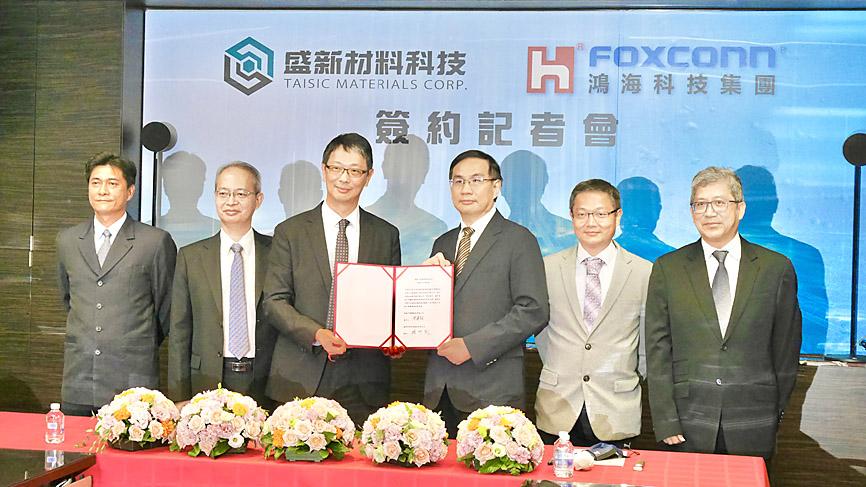Hon Hai Precision Industry Co (鴻海精密), which assembles electric vehicles for Fisker Inc and Lordstown Motors Corp, yesterday signed an agreement with Taisic Material Corp (盛新材料) to invest NT$500 million (US$16.79 million) by subscribing to Taisic’s share issue through its investment subsidiary, the latest in a slew of steps made by Hon Hai to build an electric vehicle chip ecosystem.
The deal with Taisic would help Hon Hai gain better access to silicon carbide (SiC) substrates, a key component in building electric vehicles, it said in a statement.
The investment would give Hon Hai a 10 percent stake in Taisic, one of the very few Taiwanese companies capable of producing multiple types of 6-inch SiC.

Photo, Fang Wei-chieh, Taipei Times
“SiC substrate is a key part of the electric vehicle supply chain, as it accounts for a large portion of overall SiC semiconductor costs,” Bob Chen (陳偉銘), president of Hon Hai’s semiconductor business group, said in the statement.
“The company hopes to have better control of SiC substrate supply via this investment,” he said.
To broaden its semiconductor portfolio, Hon Hai in May acquired a 30 percent stake in Advanced Power Electronics Corp (APEC, 富鼎) for about NT$2.89 billion through XSemi Corp (國創半導體), a semiconductor joint venture with passive component supplier Yageo Corp (國巨).
APEC is one of the nation’s biggest makers of metal-oxide semiconductor field-effect transistors (MOSFET), a device that is widely used for switching and to amplify electronic signals.
Hon Hai yesterday said that it expects this year to complete the deployment of its first SiC production line in Hsinchu at a 6-inch fab it purchased last year from Macronix International Co (旺宏電子).
That would provide a strong base for Hon Hai to tap into auto chips, it said.
Hon Young Semiconductor Corp (鴻揚半導體) helps operate the chip production line.

NEW IDENTITY: Known for its software, India has expanded into hardware, with its semiconductor industry growing from US$38bn in 2023 to US$45bn to US$50bn India on Saturday inaugurated its first semiconductor assembly and test facility, a milestone in the government’s push to reduce dependence on foreign chipmakers and stake a claim in a sector dominated by China. Indian Prime Minister Narendra Modi opened US firm Micron Technology Inc’s semiconductor assembly, test and packaging unit in his home state of Gujarat, hailing the “dawn of a new era” for India’s technology ambitions. “When young Indians look back in the future, they will see this decade as the turning point in our tech future,” Modi told the event, which was broadcast on his YouTube channel. The plant would convert

‘SEISMIC SHIFT’: The researcher forecast there would be about 1.1 billion mobile shipments this year, down from 1.26 billion the prior year and erasing years of gains The global smartphone market is expected to contract 12.9 percent this year due to the unprecedented memorychip shortage, marking “a crisis like no other,” researcher International Data Corp (IDC) said. The new forecast, a dramatic revision down from earlier estimates, gives the latest accounting of the ongoing memory crunch that is affecting every corner of the electronics industry. The demand for advanced memory to power artificial intelligence (AI) tasks has drained global supply until well into next year and jeopardizes the business model of many smartphone makers. IDC forecast about 1.1 billion mobile shipments this year, down from 1.26 billion the prior

People stand in a Pokemon store in Tokyo on Thursday. One of the world highest-grossing franchises is celebrated its 30th anniversary yesterday.

Zimbabwe’s ban on raw lithium exports is forcing Chinese miners to rethink their strategy, speeding up plans to process the metal locally instead of shipping it to China’s vast rechargeable battery industry. The country is Africa’s largest lithium producer and has one of the world’s largest reserves, according to the US Geological Survey (USGS). Zimbabwe already banned the export of lithium ore in 2022 and last year announced it would halt exports of lithium concentrates from January next year. However, on Wednesday it imposed the ban with immediate effect, leaving unclear what the lithium mining sector would do in the